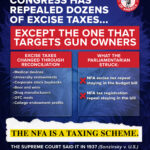
While the news lately has been very positive for post-Bruen Second Amendment challenges, it’s not all downhill. Illustrative of that is yesterday’s decision in Reese v ATF (PDF), a test case challenging the portion of the 1968 Gun Control Act that prohibits sales of handguns and handgun ammunition to adults under 21.
Earlier this week, the State of Texas abandoned its appeal of an order striking down a Texas laws prohibiting the public carrying of handguns by adults under 21. In Reese, however, Judge Robert Summerhays (a Trump-nominated judge) ruled that the federal prohibition on sales to 18- to 20-year-olds is sufficiently supported by historical analogues.
Before everyone trashes Judge Summerhays as a RINO/traitor/scoundrel etc., the guts of his opinion was that the plaintiffs’ arguments are foreclosed by a 2012 Fifth Circuit decision, National Rifle Association v. United States, in which a Fifth Circuit panel found (over a strong dissent) that this portion of the ’68 GCA was constitutional under both intermediate scrutiny and the “text, history, and tradition” test articulated in Heller and subsequently adopted in Bruen.
Judge Summerhays’ position — that he is bound by a Fifth Circuit precedent that addresses the issues in the suit — is not unreasonable. I read his opinion as saying, essentially, “If the Fifth Circuit’s earlier opinion on this exact issue is no longer good law, then the Fifth Circuit — not a district court — needs to be the one that says so.”
While I disagree with him that that the relevant portion of NRA v. US remains good law in light of Justice Thomas’ Bruen opinion, I have to say it reflects a welcome degree of judicial modesty.
What will the Fifth Circuit do? We’ll see. In 2012, the makeup of that court was quite different, with a narrow majority of active service judges appointed by Democrat presidents (and some of the GOP-appointed ones being, shall we say, less than stalwart on Second Amendment issues).
That’s not the case today, as PDT appointed quite a few strong originalist judges to the court, including rising superstar judges like James Ho. As a result, the Fifth Circuit is currently regarded as probably the most favorable court of appeals for Second Amendment cases.
While I think there’s a good chance that a Fifth Circuit three-judge panel may simply rule that Judge Summerhays’ reading of Bruen is erroneous and thus reverse him, I will not be shocked if such an initial panel rules that NRA v. US remains binding. The reason for this is that under Fifth Circuit law, a subsequent panel is bound by the decisions of earlier panels (unless that earlier decision is superseded by a subsequent change in the law by Congress or the Supreme Court), and that only the entire court (en banc) can overrule such precedent.
Such a ruling, however, will almost certainly include either a dissent or concurrence urging the entire court to take the case and reconsider NRA v. US in light of Bruen. Such a decision would require a majority of active service judges on the Fifth Circuit to vote to take the case.
Are the votes there at the Fifth Circuit to take the Reese case en banc and unambiguously abrogate NRA v. US? As I count noses at the Court, I think so. And if they take Reese for en banc rehearing, we might also see some language telegraphing that other pre-Bruen Fifth Circuit Second Amendment decisions are no longer good law.
For example, in Mance v. Sessions, a Fifth Circuit panel reversed a decision finding that the ’68 GCA prohibition on handgun sales by FFL’s to out-of-state residents was unconstitutional, and the petition for rehearing en banc failed by one vote. There’s little question that if Mance was heard today, the votes on the petition for rehearing en banc would be very different.
Watch this space. This case is far from over.


